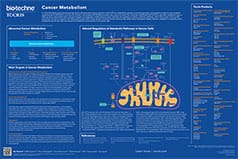Immune Checkpoints
Immune checkpoint molecules are inhibitory receptors expressed on immune cells that activate immunosuppressive signaling pathways. They are upregulated during infections and are important in modulating the immune response, maintaining self-tolerance and protecting tissues from immune-driven damage. Certain metabolic enzymes, such as indoleamine 2,3-dioxygenase (IDO), tryptophan 2,3 dioxygenase (TDO) and arginase, are also considered to be immune checkpoint molecules as they cause local depletion of amino acids that are essential for immune cell function.
Immune Checkpoint Inhibitors |
|
|---|---|
| Cat. No. | 产品名称/活性 |
| 4392 | 680C91 |
| Potent and selective tryptophan 2,3-dioxygenase (TDO) inhibitor | |
| 7831 | AUNP 12 |
| Peptide inhibitor of the PD-1 signaling pathway | |
| 1545 | (R)-(+)-Bay K 8644 |
| TMEM176B inhibitor; activates inflammasomes; also CaV1.x blocker | |
| 6007 | INCB 024360-analog |
| Potent indoleamine 2,3-dioxygenase (IDO) inhibitor | |
| 6068 | Lin28 1632 |
| Lin28 inhibitor; suppresses PD-L1 expression and enhances T cell-mediated antitumor immunity; also bromodomain inhibitor | |
| 5698 | 1-Methyl-D-tryptophan |
| Indoleamine 2,3-dioxygenase (IDO) inhibitor | |
| 8119 | ML T7 |
| Inhibitor of phosphatidylserine/CEACAM1 binding to Tim-3 | |
| 6370 | Nor NOHA monoacetate |
| Arginase inhibitor | |
| 6515 | (D)-PPA 1 |
| PD-1/PD-L1 interaction inhibitor | |
| 8050 | SA-15-P |
| Dual inhibitor of LAG3 interaction with both MHCII and FGL1 | |
| 6979 | SEN 177 |
| Disrupts binding of SIRP-α to CD47; potent glutaminyl cyclase inhibitor. | |
| 7533 | ZE 132 |
| Potent and selective PD-1/PD-L1 interaction inhibitor | |
Immune checkpoint receptors and ligands, such as programmed cell death protein 1 (PD1) and cytotoxic T lymphocyte antigen (CTLA4), are being targeted in cancer research as they are upregulated in a variety of tumor types, enabling the tumor to evade the immune system. Antagonistic antibodies targeting CTLA4 and PD1 have been developed as immunotherapies for a number of different cancers. In addition, activation of IDO and TDO in tumors inhibits T cell function and allows tumors to escape the immune system.
Immune checkpoints are also of interest in infectious diseases. Pathogens promote inhibitory interactions between immune cells through immune checkpoint proteins that help them evade immune control. Chronic infection can reduce T cell effector function and cause sustained expression of immune checkpoint molecules, poor recall responses, and an altered transcriptional state of T cells. This is known as T cell "exhaustion" and could be reversed by checkpoint blockade. Immune checkpoint blockade also has potential for improving treatments for acute infections and vaccines.
Literature for Immune Checkpoints
Tocris offers the following scientific literature for Immune Checkpoints to showcase our products. We invite you to request* your copy today!
*Please note that Tocris will only send literature to established scientific business / institute addresses.
Cancer Metabolism Poster
This poster summarizes the main metabolic pathways in cancer cells and highlights potential targets for cancer therapeutics. Genetic changes and epigenetic modifications in cancer cells alter the regulation of cellular metabolic pathways providing potential cancer therapeutic targets.
